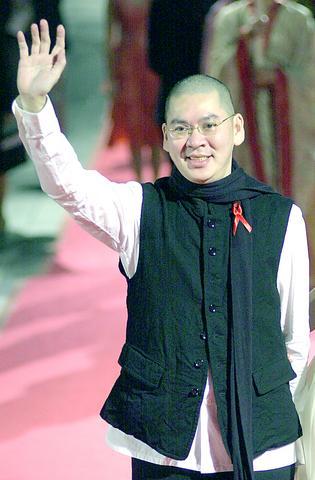The 40th Golden Horse Awards (
Hong Kong crime drama Infernal Affairs (

PHOTO: AFP
Tony Leung (

PHOTO: AP
Another star from Hong Kong, Sandra Ng (
An ecstatic Ng, while accepting the award said, "If you think my role in this movie was good, you should see me in the sequel."
Anthony Wong (
The honors for best director were handed to Andrew Lau (
"I was expecting to take at most four awards, so I'm really pleased with this result," Andrew Lau said at the end of the ceremony. But Alan Mak expressed disappointment that Andy Lau did not win the best lead actor and said he would write another film specifically for him.
Taiwanese director Tsai Ming-liang (
Goodbye, Dragon Inn and its partner film The Missing (
Chen Sheng-chang (
"I'm very thankful for the Central Motion Picture Corporation (CMPC), where I learned editing. Without the CMPC I wouldn't be here."
Liao Pen-jung (
Liao first worked with Tsai on Rebels of the Neon God in 1992 and worked with Tsai on each of the director's films since then. The Missing, which was directed by Tsai's protege Lee Kang-sheng (
Wang Baoqiang (
This year, despite Infernal Affairs dominance, the awards were quite evenly divided between Taiwan, Hong Kong and China and many awards were given to non-commercial films, in particular Taiwan's Goodbye, Dragon Inn and The Missing.
Last night, Tainan basked in the limelight, with the arrival of stars such as Andy Lau, Leon Lai (
The city's 300-year-old historical buildings, such as the Confucian Temple and Yi-tsai Gold Castle were specially decorated for the event.
The whole city came out in support of the awards. All the eateries famous for Tainan delicacies, many of which have been in business more than 100 years, donated their local snacks to guests. And even the betel-nut girls at stands near the Tainan interchange and Tainan airport all wore cheongsams, reportedly under pressure from the city's police, to welcome the event to the city.
Beginning at 2pm, fans of Andy Lau and Leon Lai -- mostly teenag girls -- lined up on the two sides of the red carpet in front of Tainan Cutural Center.
"Tonight I have to see Leon Lai and Lee Sin-jie (
The award ceremony also paid a special tribute to Taiwanese action actor Ke Shou-liang (

In the March 9 edition of the Taipei Times a piece by Ninon Godefroy ran with the headine “The quiet, gentle rhythm of Taiwan.” It started with the line “Taiwan is a small, humble place. There is no Eiffel Tower, no pyramids — no singular attraction that draws the world’s attention.” I laughed out loud at that. This was out of no disrespect for the author or the piece, which made some interesting analogies and good points about how both Din Tai Fung’s and Taiwan Semiconductor Manufacturing Co’s (TSMC, 台積電) meticulous attention to detail and quality are not quite up to

It is one of the more remarkable facts of Taiwan history that it was never occupied or claimed by any of the numerous kingdoms of southern China — Han or otherwise — that lay just across the water from it. None of their brilliant ministers ever discovered that Taiwan was a “core interest” of the state whose annexation was “inevitable.” As Paul Kua notes in an excellent monograph laying out how the Portuguese gave Taiwan the name “Formosa,” the first Europeans to express an interest in occupying Taiwan were the Spanish. Tonio Andrade in his seminal work, How Taiwan Became Chinese,

Mongolian influencer Anudari Daarya looks effortlessly glamorous and carefree in her social media posts — but the classically trained pianist’s road to acceptance as a transgender artist has been anything but easy. She is one of a growing number of Mongolian LGBTQ youth challenging stereotypes and fighting for acceptance through media representation in the socially conservative country. LGBTQ Mongolians often hide their identities from their employers and colleagues for fear of discrimination, with a survey by the non-profit LGBT Centre Mongolia showing that only 20 percent of people felt comfortable coming out at work. Daarya, 25, said she has faced discrimination since she

April 21 to April 27 Hsieh Er’s (謝娥) political fortunes were rising fast after she got out of jail and joined the Chinese Nationalist Party (KMT) in December 1945. Not only did she hold key positions in various committees, she was elected the only woman on the Taipei City Council and headed to Nanjing in 1946 as the sole Taiwanese female representative to the National Constituent Assembly. With the support of first lady Soong May-ling (宋美齡), she started the Taipei Women’s Association and Taiwan Provincial Women’s Association, where she